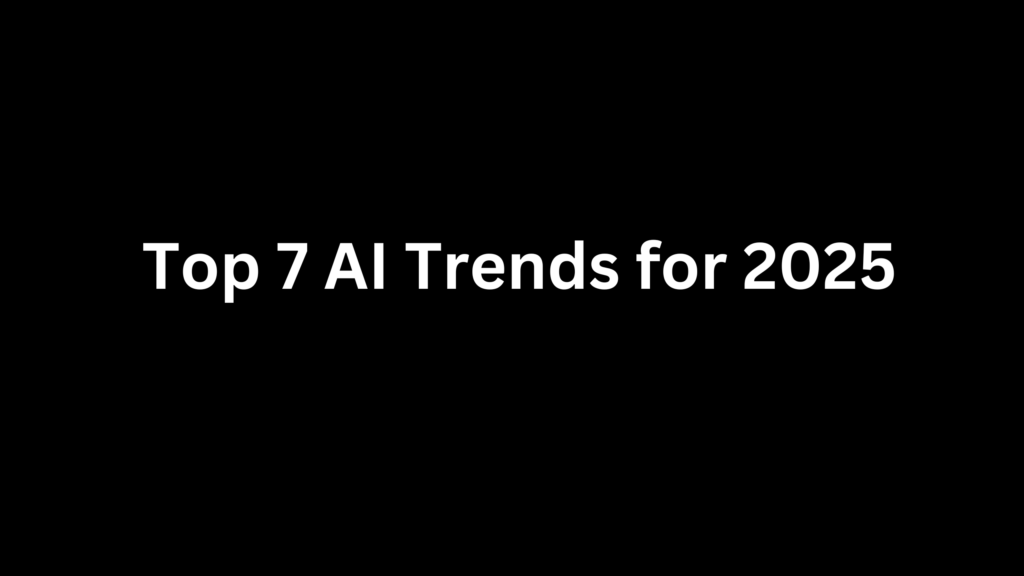Top 7 AI Trends for 2025: A Comprehensive Overview
 Naveen
Naveen- 0
Key AI Trends for 2025:
AI is becoming more and more sophisticated as we see an estimated revolutionary change in the field of software, hardware, and computational algorithms in 2025. This is a detailed look at the most impactful AI trends that are already changing technology.

1. 2025 AI Competition and Model Development
The AI model marketplace is no longer dominated by a single player. While OpenAI’s ChatGPT initially captured mainstream attention, the field now includes robust competitors:
- Anthropic’s Claude
- Google’s Gemini
- Meta’s open-source models
- Xai’s Grok
- Microsoft’s offerings
Interestingly, some applications now dynamically switch between models based on pricing and performance, indicating a more competitive and flexible AI ecosystem.
2. Emerging AI Trends 2025: Software and Development
Coding has been dramatically transformed by AI-powered tools like GitHub Copilot. Developers now receive intelligent code suggestions in real-time, significantly enhancing productivity. This trend extends beyond coding, with AI tools emerging in specialized domains:
- Research: Jenny AI for academic writing
- Legal: Harvey AI for legal document processing
3. Advanced Image Generation
AI image generation has reached a sophisticated level, impacting industries like stock photography. While images still sometimes have a recognizable “AI look,” they’re becoming increasingly sophisticated, causing disruption in traditional stock photo markets.
4. Robotics and AI Vision
Hardware applications of AI are expanding, particularly in robotics:
- Self-driving vehicles (Waymo, Tesla, Cruise)
- Autonomous drones
- Warehouse and manufacturing robotics
AI’s breakthrough in image recognition enables these technologies to “see” and navigate complex environments.
5. Video Generation Potential
2025 might be the breakthrough year for AI video generation. Open AI’s Sora model hints at the potential for creating high-quality videos from text prompts, though the technology is still developing.
6. Smaller, Localized AI Models
An underrated trend is the development of smaller, device-embedded AI models like Google’s Gemini Nano. These models can:
- Operate without internet connection
- Provide near-instantaneous responses
- Be embedded directly in browsers or mobile devices
7. AI Trends 2025: Intelligent Agents
The concept of AI agents represents a significant shift from traditional software. Unlike rule-based systems, AI agents can handle complex, open-ended tasks like:
- Investigating and fixing GitHub issues
- Dynamically selecting appropriate tools
- Performing multi-step problem-solving
The Computational Future
Despite discussions about AI models potentially hitting a “performance ceiling,” massive investments continue. Nvidia’s revenue has grown 94% year-over-year, indicating substantial computational infrastructure growth.
Learning and Adaptation
For professionals looking to stay ahead, platforms like DataCamp offer comprehensive AI learning tracks, from fundamentals to advanced application development.
Conclusion
The AI landscape in 2025 promises unprecedented innovation, with advancements spanning software, hardware, and computational capabilities. As models become more sophisticated, localized, and versatile, we’re witnessing a technological revolution.
Author
-

Naveen Pandey has more than 2 years of experience in data science and machine learning. He is an experienced Machine Learning Engineer with a strong background in data analysis, natural language processing, and machine learning. Holding a Bachelor of Science in Information Technology from Sikkim Manipal University, he excels in leveraging cutting-edge technologies such as Large Language Models (LLMs), TensorFlow, PyTorch, and Hugging Face to develop innovative solutions.
View all posts

